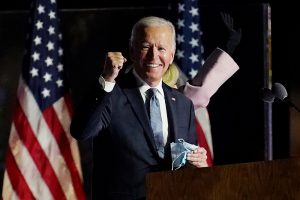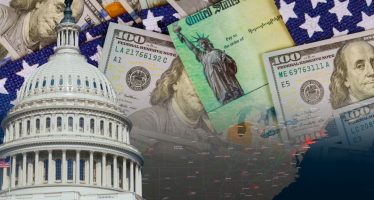The First Days: The Need for Speed in US Politics

President Joe Biden
In his inauguration speech, President Joe Biden called US democracy precious and fragile: “And at this hour, my friends, democracy has prevailed.”
The statement made for a stirring moment and afforded a sigh of relief after the events of January 6 when unruly hordes of assorted political misfits stormed the Capitol in Washington, effectively laying siege to Congress. Americans suddenly realised that their country’s democracy is not necessarily a given – or all that stable.
President Biden’s comforting reassurances about the resilience of the US system of government, and his promise to calm the waters and depolarise the public debate, are welcome and much needed. However, US democracy survived by the skin of its teeth and remains brittle. Its inconsistencies and flaws are many. In 2016, Hillary Clinton won the popular vote by a margin of three million, yet Donald Trump seized the White House. In 2000, George W Bush also lost the popular vote, albeit by a smaller margin, but managed to claim victory via the rather archaic electoral college.
What was dismissed a novel quirk twenty years ago – the last time such a discrepancy in the outcome had happened was in 1888 when Benjamin Harrison ousted incumbent Grover Cleveland on this technicality – seems to have become a feature of a system rigged by the state legislatures who are in control of the decennial redistricting exercise. Though on November 3, Donald Trump received seven million less votes than Joe Biden, it would have required only about 40,000 switched ballots in key battleground states for Trump to have secured a second term in office. This, perhaps, helps explain his frantic efforts to insist on recounts and finding lost or discarded ballots.
In the US Senate, now evenly split with Vice-President Kamala Harris holding the decisive vote, the fifty Democratic senators represent 41 million more people than their 50 Republican colleagues. The democratic feedback loop, whereby voters choose leaders who are then periodically judged on their performance and either replaced or confirmed, has been partially broken by a lopsided senate, the electoral college, and curious political americana such as gerrymandering – the practice of redrawing voting districts for the benefit of the ruling party – and filibustering, holding up or preventing unwanted legislation through interminable debates, usually over riders attached to the original bill. Though invented as a tactic in Ancient Rome, American senators and representatives have perfected the filibuster to an art form.
Millions of Americans remain disenfranchised as well. The around 700,000 residents of Washington DC have no representation in Congress. Nor do the 3.2 million inhabitants of Puerto Rico which subsists in a sort of political limbo – or purgatory – and has been promised statehood countless times without any discernible effect. Puerto Rico’s electoral roll would be larger than that of twenty existing states. In the Caribbean territory and Washington DC hopes are, again, high that the Democrats will come through and admit both into the union as the 51st and 52nd states.
Although the Biden Administration controls both the House and Senate, their majority is razor thin and may easily be neutralised by filibusters which need a sixty-vote majority to be shot down in the Senate – ten seats more than the Democrats command. Approval of President Biden’s signature $1.9 trillion rescue plan is not expected to suffer delays in the House of representatives but may struggle to sail through the Senate where a number of Republicans have already signalled their intention to filibuster. The acerbic political clime is unlikely to award the President the courtesy of a congressional honeymoon.
According to Amy Lerman, author of Good Enough for Government Work, the US government suffers a reputational crisis where people just assume poor outcomes of any federal policy initiative. The public focusses on the flaws and often overlooks the virtues and accomplishments. Disappointed and fed up, a growing number of voters is eager for the snake oil peddled by demagogues promising miracle cures. The title of Lerman’s book originates from the Second World War when private business had to meet the exceptionally stringent standards imposed by a government dealing with multiple crises. However, in the 1960s and 1970s Good Enough for Government Work became a slur as standards were relaxed and services provided shrank in both reach and quality.
The Biden Administration has a two-year window of opportunity – the 2022 midterms loom large – to deliver on its promise to reconnect with Americans and make government part of the solution rather than originator of the problem. Its task is Herculean: the US, and indeed much of the world, is grappling with multiple self-reinforcing crises. First amongst these, of course, the Corona Pandemic and its economic fallout. The ebullience of the markets also poses a pressing concern. Waves of quantitative easing and a string of other loose monetary and fiscal policy initiatives have inflated equity markets to, what many analysts fear, a bubble almost unprecedented in size.
Seldom before has there been a greater disconnect between Main Street and Wall Street – and between the nation and its government. Those gaps need to be reduced. Bridges need building with no time to lose. President Biden is on the case and needs to keep moving fast along three key vectors: help people and small businesses effectively and visibly; deepen and broaden US democracy; and take politics seriously in recognition of the fact that the past four years may not have been a hiccup, but a reflection of a national mood turning sour. A defeat in the 2022 midterms, resulting in a lame duck administration, would prove that Trump – or someone who carries a similar lightning rod for public anger – was not an exception in American politics but its latest fixture.
You may have an interest in also reading…
Brexit Nears, Hedge Funds Flip Sides, and IMF Urges Spending
The yield on the benchmark 10-year German bund this week dipped to minus 0,63 percent as investors scrambled for safety
Blessings, Curses, Co-operation and Collaboration – the Virus is Forcing Knowledge upon us
No one was expecting this. No one knows what will happen next. Does that make this a time to hunker
Waiting for the Government to Come Knocking
Streamlined to a skeleton, the US federal government is singularly unable to keep up with politicians eager to dole out


















































































